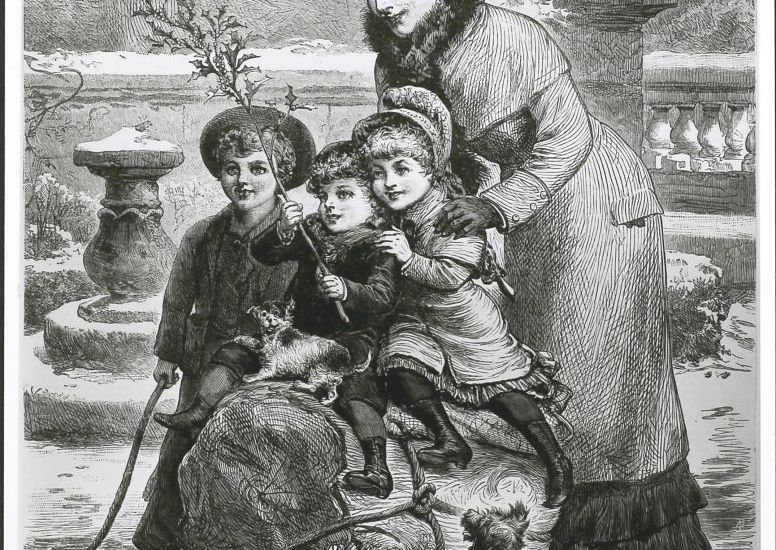It’s as much a part of the season now as baubles, tinsel and the Christmas Number One: those articles, blogs and memes that pop up during the festive season claiming that Christmas, in spite of the name, is actually a pagan festival. Certainly, the visitor to contemporary Britain would be forgiven for thinking that Christmas has little or nothing to do with the birth of Jesus Christ; and indeed there are many things we do at Christmas, and have done for centuries, that seem to have scant connection to any sort of religious celebration. What does decking the halls with boughs of holly have to do with Jesus? Or Christmas pudding? Or Christmas ghost stories? Or the older traditions of misrule, riotous mumming and reversing positions of authority? Clearly the festive season’s sometimes tenuous relationship to the Christian faith is not just a recent outcome of secularisation. There simply never was a time when Christmas was a purely religious festival, blissfully uncommercialised and holy, as some earnest clergy might like us to believe. Its ambiguous nature as a festival both sacred and profane is a feature of Christmas, not a bug.
But does that mean that Christmas is pagan? The claim that Christmas is pagan usually takes two interconnected forms. One is the argument that, in the early centuries of Christianity, the Roman church selected the festival of the deity Sol Invictus (‘the Unconquered Sun’) on 25 December as an arbitrary date on which to celebrate Christ’s birth. Christianity thus co-opted a pagan festival and tapped into the power of pagan midwinter celebrations, Christianising them over the course of the centuries. Another form of the argument focuses more specifically on England, holding that the midwinter celebrations of Geola (Yule) and ‘Mothers’ Night’ (modraniht) were ostensibly Christianised as Christmas, but the old celebrations continued under cover of the new faith.
Its ambiguous nature as a festival both sacred and profane is a feature of Christmas, not a bug
The idea that Christmas is essentially pagan is not only advanced by neopagans – who are, understandably, keen to lay claim to the season in their own terms – but also by humanists, atheists, secularists and sometimes even by evangelical Christians who object to the celebration of Christmas, Oliver Cromwell-style, on the grounds that 25 December is nowhere mentioned in Scripture as Christ’s birthday. But while it is true that the Romans celebrated Sol Invictus on 25 December, it would be inaccurate to see the decision to celebrate Christ’s birth on that date as an attempt to appropriate an ancient pagan festival – for the cult of Sol Invictus was itself a novelty, recently shoehorned into the season between Saturnalia on 17 December and the Consular new year on 1 January by the Emperor Aurelian.
The Christians had an independent reason for celebrating Christ’s birth on 25 December, which falls exactly nine months after the feast of the Annunciation (celebrating Christ’s conception) on 25 March. Easter was by far the most important festival for the early Christians. The date of Easter itself is, of course, a mobile one, but in early Christian tradition, Christ was said to have died on 25 March, the traditional date of the spring equinox. It was fitting, therefore, that the Word should have become flesh on the same date, when the Holy Spirit conceived Christ in Mary’s womb at the Annunciation. (This followed the same sort of parallelistic thinking that claimed Christ was crucified over the grave of Adam, or that the wood of the cross came from a tree descended from the Tree of Knowledge.) As soon as Christ’s conception was fixed at the spring equinox, his birth became a midwinter event – fittingly enough, in the northern hemisphere, as the ‘Sun of Righteousness’ began to regain dominance over the darkness at the Winter Solstice.
The celebration of Christmas is suffused with probable pre-Christian elements, from the Yule Log to the Lord of Misrule (an official appointed to oversee the festivities) but this should hardly surprise us. After all, the priority of early missionaries was to ensure that people came to believe in the Christian God. Customs with no direct bearing on the basics of belief were often left alone; for example, it was several centuries before Anglo-Saxon missionaries to Germany began to interfere in pre-Christian funeral rites or betrothal customs. The medieval church did not, as some think, demand control of every aspect of people’s lives. However, whether surviving pre-Christian customs should be called pagan is debateable, since ‘paganism’ seems to imply something to do with the cult of pagan deities. It is pretty clear that such cults disappeared fairly quickly, within a few decades of the Christianisation of most European nations, even if many other traces of pre-Christian culture remained.
So, is Christmas pagan? In the sense that Christmas is a festival that retains, in most cultures, elements of pre-Christian midwinter festivities, the answer can be yes – provided we’re prepared to use the word ‘pagan’ in quite a loose way. But, crucially, none of those pre-Christian elements of Christmas are specifically religious; and in fact, we have almost no idea how the pagan Anglo-Saxons celebrated the midwinter season. And so it’s potentially misleading to describe them as pagan. Insofar as Christmas is a religious festival, it is an unambiguously Christian event, of Christian origin. It celebrates the birth of Christ, not the rebirth of the Sun. But perhaps the most important point is that Christmas has never been solely a religious festival – even if Christmas is not pagan, Christmas has always contained a strong element of the profane.
Got something to add? Join the discussion and comment below.
Get 10 issues for just $10
Subscribe to The Spectator Australia today for the next 10 magazine issues, plus full online access, for just $10.



















Comments
Don't miss out
Join the conversation with other Spectator Australia readers. Subscribe to leave a comment.
SUBSCRIBEAlready a subscriber? Log in